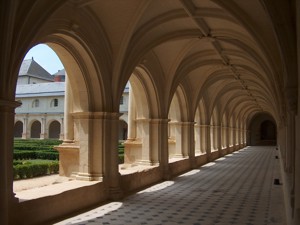Cloisters

This has both a literal and symbolic definition.
Literally, a cloister is a covered walk forming the perimeter of a building’s open central square. It’s from the Latin word for “enclosure.”
Symbolically, “cloisters” refers to a separated religious life. To be “in cloisters” is to life a monastic life away from other people.
In that sense, “cloisters” can also be used to refer to a place of religious worship of study. (See: Synecdoche)
Why I Looked It Up
The word was used quite a bit in The Swerve: How the World Became Modern. For example, in describing the perspective one person had of monks:
Behind the thick walls of the cloisters, the parasites would mumble their prayers and live of the income generated by those who farmed the monastery’s extensive landholdings.
Update
Added on
Here’s a video of someone making The Met Cloisters out of gingerbread.
The real building is a museum in Washington Heights.